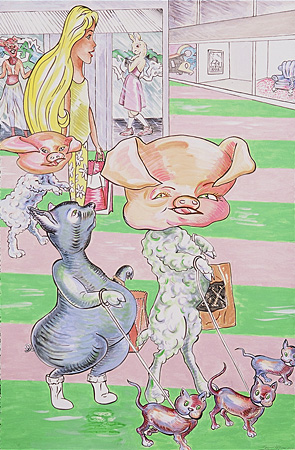 |
"In her new show at Pepper Gallery, she's riffing on coloring books from the 1940s and '50s, when she was a kid.
Three bodies of work — all acrylic or ink on paper — use the bold lines and bright tones of that style. In the best, a wonderfully freakish and disturbing group, contorted hybrid animals put a B-movie spin on the Dick and Jane world evoked by the coloring-book style. 'Day at the Mall' has a snarky-looking pig with a lamb's body mincing through a mall beside a plump dog with a hog's tail. Genetic engineering and animal feed laced with hormones and antibiotics have changed life on the farm into a nightmare." — Cate McQuaid, "Coloring Book Capers," The Boston Globe, Thursday, September 21, 2006 In Coloring Book Hybrids: An Artist Reinterprets Childhood, Moss reflects on society as she sees it today. 'Day at th Mall' uses a unique sense of humor to criticize a perverse urban environment, degraded by obesity, arrogance, frivolity, and gluttony." — George Gerard, "Karen Moss & Tabitha Vevers," Artscope, Sept/Oct 2006 — Matthew Nash, "Karen Moss @ Pepper Gallery," Big Red and Shiny, Issue #49, launched October 2, 2006 |
|
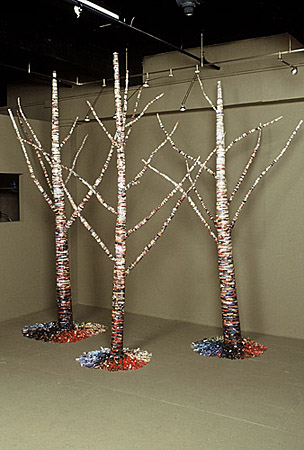 |
"Moss's graceful, life-size trees, sculpted and collaged from mail-order catalogs, prod the conscience in their exposition of nature serving the hungry consumer." — Meredith Fife Day, "Unnatural Order — Shiltkamp Gallery, Traina Center for the Arts, Clark University/Worcester, MA, Art New England, April/May 2006 |
|
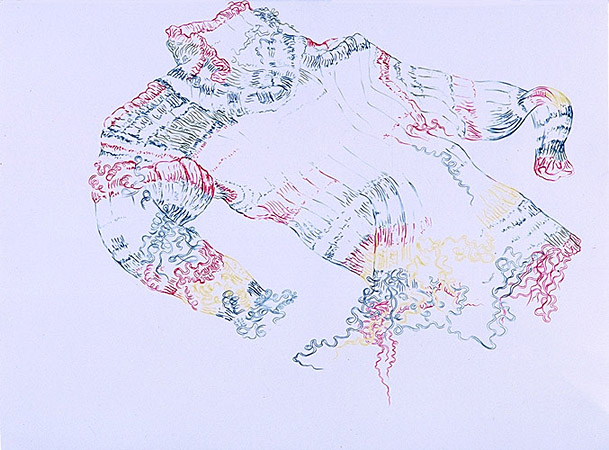 |
"'Sweater Series' is a deft group of drawings in which an old, multicolored sweater slowly unravels to mere threads. The artist never loses sight of the figure in these works, but verges toward abstraction with blank patches, making the garment appear both more beautiful and more precarious...It's when Moss takes her tongue out of her cheek and attends to the creation of beauty that she finally makes gold from dross. Two pieces titled "Full Cycle" depict trees; the colors of the catalog strips where figure meets ground wink satisfyingly against one another. In a crowning touch, Moss constructed three tree forms from chicken wire and clad them in catalog strips. Here, she skillfully mixes colors and textures; small root systems fan out in a rainbow around each trunk. With these, Moss metaphorically sends the paper back where it came from." — Cate McQuaid, The Boston Globe, Friday, April 16, 2004 |
|
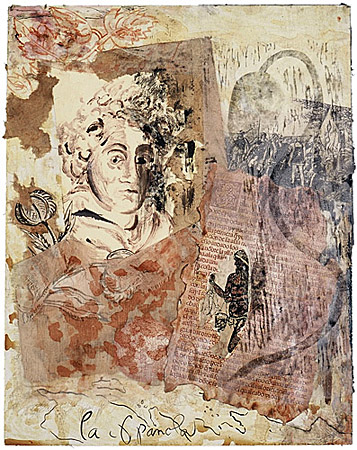 |
"The dark, narrative collages Moss gives us in her 'Columbus Series' and 'Native American Series' are laments, attempts to come to grips with the violence and loss. Three impressive 'Story-Teller Dresses' are, in their form and materials, also an homage to the Native Americans...Every piece in 'Images of the New World' contains elements of both societies. From that conflict, Moss raises many questions. She doesn't offer us answers, but she does offer us compassion, and her own version of the history that brought us here." — Cate McQuaid, "Artist turns compassionate eye on Native Americans, Europeans," The Boston Globe, Saturday, August 12, 2000. "Moss is on a mission to teach us what we should have learned in school about the story of native Americans. It's one woman's small effort, but an indelible one." — Cate McQuaid, The Boston Globe, Thursday, September 21, 2000 |
|
| "Karen Moss, in her series Images of the New World: Conversations with History, gives us a new vision of history, one in which the victims as well as the victors are heard. Using the journals of Christopher Columbus and other sources, she reclaims and represents the history ad habitats of Native Americans in the meeting of nature and history and the clash of two civilizations. Even the techniques Moss uses simulate two different worlds, with photo reproductions of printed documents and illustrations from European sources collaged over paper made of natural ingredients and painted figures with environments...
All these works speak of the past as well as the present. We are beginning to listen to the voices of the victims, and Karen Moss has given us eyes to see both the past and the present. She has made us explorers of a new land also, with its new species, customs, flora and fauna. Images of the New World: Conversations with History follows logically from Moss's earlier work using the journals of Darwin's explorations and the images of new species from Maria Sibylla Merian's illustrations. In these expressions Moss speaks the language of postmodernism in the appropriation of sources, the creation of a fragmented world and the juxtaposition of verbal and visual signs. The painter has become an explorer too; a collaborator with both history and nature, and a guide into new territory." |
||
| "There is much to decipher in these works, and Moss is most successful when she allows the more subtle images space to breathe...the works presented are lush with materials and rich with symbolism, proving Moss's skill at creating thoughtful dialogue deserving of contemplation." — Jamie Farrell, "Heritage/Lexington — Karen Moss: Images of the New World: Conversations with History," Art New England, Summer/Fall 2000 |
||
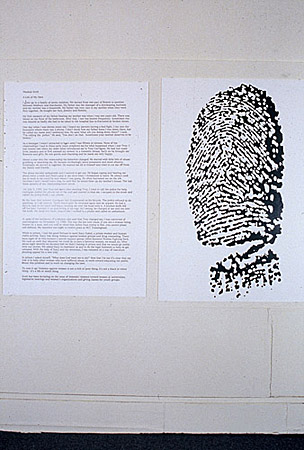 |
"The Fingerprint Project is a stunning black-and-white work by Boston artist Karen Moss. Pictures of giant fingerprints alternate with panels of text. The artist's intention is immediately clear — eight people arrested and fingerprinted, eight unique but related stories. We read direct, first-person tales of abuse, political persecution, suffering, and human resilience. The subjects include an immigrant from Zimbabwe, a Black Panther, and one of the Framingham Eight, jailed for killing her abuser. The fingerprint drawings suggest natural patterns." — "Danforth Museum of Art/Framingham — Other Views; Installations by Karen Moss, Robert Todd, Kitty Wales" "Karen Moss' 'Fingerprint Project' will startle viewers who know Moss as a painter. Recently, she has abandoned color for a black-and-white exploration of natural forms, from water patterns to tree bark. The swirling forms of fingerprints, she has found are related to other patterns in nature. Moss has made a riveting series of portraits, and the text which she has elicited from her subjects in interviews, are so compelling you'd be hard pressed not to read every word of every one." — Christine Temin, The Boston Globe, Wednesday, February 2, 1994 |
|
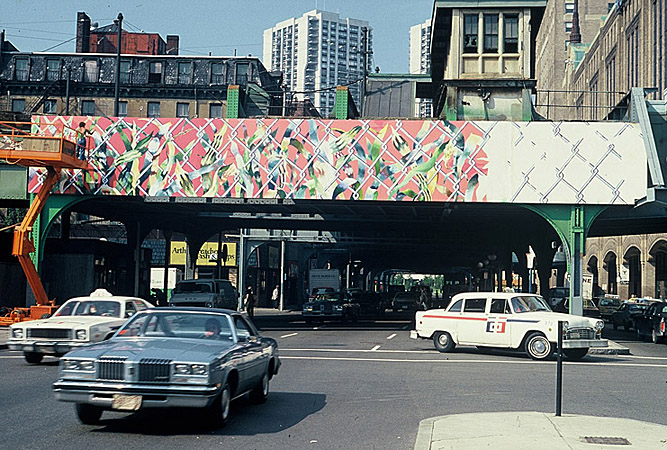 |
"The new design, titled 'Leaves N' Links' expresses Karen's concern with "the survival of plant life in the urban environment." The viewer is given a close-up look at the intricate contortions of delicate leaves growing around and through a fence. There's a strong feeling of violation in the painting." — Peggy McMahon, "Leaves N' Links MBTA Mural," Equal Times, August 28, 1977 |
|
© 2006–2015 Karen Moss. All rights reserved.